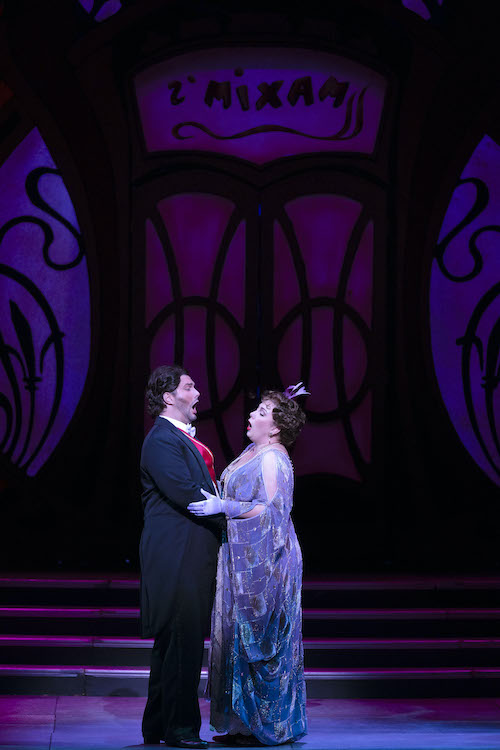Palm Beach Opera wraps season with a richly sung and resplendent “Merry Widow”

Jennifer Rowley and Andrew Manea in Franz Lehár’s The Merry Widow at Palm Beach Opera. Photo: Bruce Bennett
The imaginary Paris of Franz Lehár’s The Merry Widow is a city of parties, embassy receptions and fashionable nightclubs.
Palm Beach Opera’s production, which opened Friday at the Kravis Center in West Palm Beach, richly conveys this long-gone fantasy world with stylish Art Deco sets from Utah Opera, with swooping curves and extravagant ornamentations, including a particularly swanky portrayal of the nightclub Maxim’s.
Although the jokes may not seem quite as fresh as they did at the operetta’s 1905 premiere in Vienna, Merry Widow overflows with great tunes that haven’t lost their charm. And with fine lead singers, smart stage direction and lively conducting, Palm Beach Opera’s production made the most of one of musical comedy’s biggest hits.
The operetta focuses on Hanna Glawari, a widow whose merriment results from the 20 million francs she inherited and from the imminent end of her year of mourning. Since she’s a citizen of the poverty-stricken (but fictional) Balkan nation of Pontevedro, officials in its Paris embassy scheme to get her to marry one of her countrymen to keep the money in Pontevedro.
The plan involves reuniting her with a lost love, Count Danilo, the nightlife-loving diplomat who views monogamy as a state roughly comparable to that of an irreversible coma. There are complications, largely involving the pompous ambassador, his frisky younger wife, another man and a misplaced fan inscribed “I love you.”
The production served up great episodes—the vigorous singing and lively choreography of the “Girls, girls, girls” chorus, and the intimate dance of Hanna and Danilo to the Merry Widow waltz under a moonlit Parisian sky, with quietly luminous music in the orchestra. And the final scene at Maxim’s delivered a crimson-hued nightclub with elegant guests and a spirited corps of female dancers.
The operetta was sung in English with English supertitles that were almost unnecessary since the singers’ diction was so clear. And under stage director Helena Binder, the singers and actors made the most of the comedy without lapsing into the heavy-handed slapstick or ham acting that can mar production of classic operettas.
As the widow Hanna, the soprano Jennifer Rowley gave a realistic and affecting portrayal of a woman contemplating her second chance in a role that sometimes inspires imperious overacting. If her voice sometimes seemed a bit big and rich for operetta, she could power it back. In the famous “Vilja Song” the folktale with which she serenades party guests, she brought warm emotion to this story from her homeland, soaring to climactic high notes then floating pianissimo tones over a delicate accompaniment in the orchestra.
In the role of Hanna’s old love Danilo, the baritone Andrew Manea brought comedic timing to arias about his laziness and love of the parade of women at Maxim’s, without allowing it to break the flow of the melody. In his final scene with Hanna, as they sang the celebrated title waltz, he allowed the warmth of his voice to take over, singing with polished lyricism as he finally admitted his love for her.
As the young lovers Valencienne and Camille de Rossillon, the soprano Elizabeth Sutphen and tenor Duke Kim made a vivacious team. Her sweet lyric soprano and his suave leading-man tenor paired seamlessly in the bittersweet music with which Lehár portrays their frustrated love.
The orchestra conducted by Ward Stare gave a light, warm and technically immaculate performance. Part of the credit for the clarity of the singing goes to Stare and the orchestra for providing firm support to the singers without covering them up.
As the ambassador Baron Zeta, Dwayne Croft effectively portrayed a man whose dignity starts to crumble as he suspects his wife of cheating— as well as his economic self-interest as he contemplates how his country’s loss of the widow’s fortune will end his cushy gig in Paris. Urbane and elegant in white tie, tails and blue sash, he contributed a firm baritone to the ensemble numbers.
Palm Beach Opera’s production of The Merry Widow will be repeated 7:30 p.m. Saturday and 2 p.m. Sunday. pbopera.org
Palm Beach Opera’s 2023 season will include Puccini’s Madama Butterfly, Mozart’s Così fan tutte and Verdi’s Falstaff.
Posted in Performances
Leave a Comment
Sat Mar 26, 2022
at 12:51 pm
No Comments






